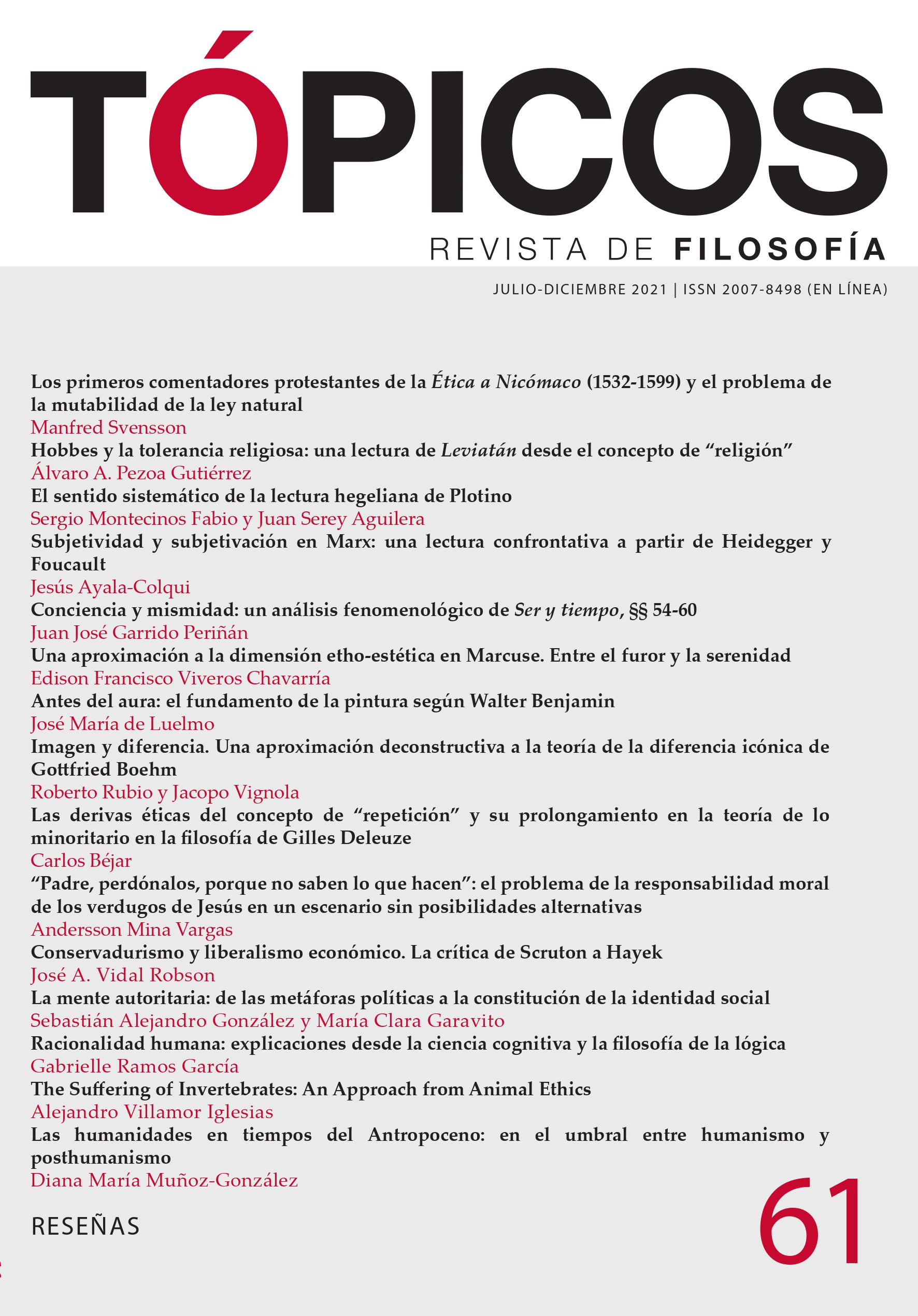Publicado 2021-06-23
Palabras clave
- autoritarismo,
- líder,
- seguidores,
- psicópata exitoso,
- héroe
- amigo-enemigo ...Más
Derechos de autor 2021 Tópicos, Revista de Filosofía

Esta obra está bajo una licencia internacional Creative Commons Atribución-NoComercial-SinDerivadas 4.0.
Cómo citar
Resumen
Este artículo trata sobre los procesos mentales de las personas autoritarias. En primer lugar, abordamos tales procesos desde el tipo de metáforas que encarnan, al entender las metáforas como marcos conceptuales que configuran el pensamiento humano. Esos marcos se entienden como constructos sociales de los que se apropia el pensamiento individual del ser social. En ese orden de ideas, indagamos por los marcos de referencia a los que apela el pensamiento autoritario. Uno de ellos es el marco de la familia y la del padre como figura principal que explica las relaciones jerárquicas. Otro es el dualismo amigo-enemigo: a través de éstos, la identidad autoritaria establece unas relaciones con los otros que corresponden a una visión maniquea del mundo: los amigos serán aquellos que son capturados por las metáforas a las que apela el autoritario y su forma particular de entender el mundo; los otros son los enemigos. Así, el autoritario se concibe como un héroe, con lo que esta figura (como marco conceptual en sí misma) permite entender ciertos imaginarios y su relación con un objetivo personal: tal objetivo deja de ser individual para ser la meta del colectivo, y el autoritario se autoproclama como el garante de su consecución. Finalmente, desde los marcos como constructos sociales pasamos a indagar acerca del carácter del autoritario como síntoma de una particular constitución de identidad; tal constitución nos recuerda la figura del psicópata exitoso, cuya identidad está formada sobre por unas agendas y una perspectiva del mundo inflexibles que incluso ponen en riesgo su propia integridad.
Descargas
Referencias
- Adorno, T. W., Frenkel-Brunswik, E., Levinson, D. J., Sanford, R. N. (1950). The Authoritarian Personality. Harper & Row
- Altemeyer, B. (2006). The Authoritarians. University of Manitoba.
- Arendt, H. (2006). Los orígenes del totalitarismo. Alianza.
- Baudrillard, J. (1981). Simulacres et simulation. Galilée.
- Bush califica los ataques de “actos de guerra” de “un nuevo enemigo”. (2001, 11 de septiembre). El País. URL: https://elpais.com/internacional/2001/09/12/actualidad/1000245607_850215.html.
- Caicedo Atehortúa, J. C. (2016). “¿Ésta es la paz de Santos?”: el partido Centro Democrático y su construcción de significados alrededor de las negociaciones de paz. Revista CS, 19, 15-37.
- Canetti, E. (2005). Crows and Power. Continuum.
- Derrida, J. (1988). The Politics of Friendship. Journal of Philosophy, 85(11), 632-644.
- Derrida, J. (1993). Politics of Friendship. American Imago, 50(3), 353-391.
- Diez años del comienzo del fin de las Farc (2018, 4 de febrero). Semana. URL: https://www.semana.com/nacion/articulo/diez-anos-de-lamarcha-del-4-de-febrero-de-2008-contra-las-farc/555856.
- Dutton, K. (2013). The Wisdom of Psychopaths: What Saints, Spies, and Serial Killers Can Teach Us About Success. Farrar, Straus and Giroux.
- Fausto, C. (2012). The Friend, The Enemy, and the Anthropologist: Hostility and Hospitality among the Parakanã. The Journal of the Royal Anthropological Institute, 18, 196-209.
- Frank, G. (2003). Dependence is Dead, Long Live Dependence and the Class Struggle: A reply to Critics. En R. Chilcote (ed.), Development in Theory and Practice. Latin American Perspectives in the Classroom. (pp. 39-46).
- Oxford University Press.
- Frankfurt, H. G. (1988). Identification and Wholeheartedness. En The Importance of What We Care About. (pp. 159–176). Cambridge University Press.
- González, S. A. (2018). Tiempos de ira: violencia, guerra y alegrías humanas. Pensamiento. Revista de investigación e información filosófica, 4(280), 487-507.
- Haidt, J. (2003). The Moral Emotions. En R. Davidson, K. Scherer y H. Goldsmith (eds.), Handbook of Affective Sciences. (pp. 852-870). Oxford University Press.
- Haidt, J. (2012). The Righteous Mind. Pantheon
- Horkheimer, M. y Adorno, T. (2002). Dialectics of the Enlightenment. Stanford University Press.
- Kohlberg, L (1992). Psicología del desarrollo moral. Editorial Descleé de Brouw.
- Lakoff, G. (2007). No pienses en un elefante. Lenguaje y debate político. Editorial Complutense.
- Lakoff, G. (2008). Puntos de reflexión. Manual del progresista. Península.
- Lawson, T. (1997). Economics and Reality. Routledge.
- Lucas, M. H. (2006). The Enemy of My Enemy Is Not My Friend: Fundamentalists, Democracy and Human Rights. Off Our Backs, 36(3), 14-17.
- Nolte, E. (1979). What Fascism Is Not: Thoughts of the Deflation of a Concept. The American Historical Review, 84(2), 389-394.
- Oakeshott, M. (1961). Rationalism in Politics and Other Essays. Basic Books.
- Oren, I. (2000). Uncritical Portrayals of Fascist Italy and of Iberic-Latin Dictatorships in American Political Science. Comparative Studies in Society and History, 42(1), 87-118.
- Parsons, T. (1942). Some Sociological Aspects of the Fascist Movements. Social Forces, 21(2), 138-147.
- Payne, S. (2003). A History of Fascism: 1914-45. Taylor & Francis Group.
- Prinz, J. (2007). The Emotional Construction of Morals. Oxford University Press.
- Rejali, D. (2004). Friend and Enemy, East or West: Political Realism in the Work of Usama bin Ladin, Carl Schmitt, Niccolo Machiavelli and Kai-Ka’us ibn Iskandar. Historical Reflections, 30(3), 425-443.
- Robin, C. (2011). The Reactionary Mind. Oxford University Press.
- Schmitt, C. (2009). El concepto de lo político. Alianza editorial.
- Skarlatos, T. (2018). Prejudice and Pride in Hungary: Inside the Far Right. [Video documental]. Al Jazeera. URL: https://www.aljazeera.com/programmes/radicalised-youth/2018/10/prejudice-pridehungary-181029060026570.html.
- Sloterdijk, P. (2013). In the World Interior of Capital. For a Philosophical Theory of Globalization. Polity Press.
- Sorel, G. (1925). Reflections on Violence. George Allen & Unwin.
- Varga, S. (2015). Identifications, Volitions and the Case of Successful Psychopaths. Dialectica, 69(1), 87–106.
- Vernant, J. P. (1973). Mito y pensamiento en la Grecia antigua. Ariel.
- Welch, D. (2004). Nazi Propaganda and the Volksgemeinschaft: Constructing a People’s Community. Journal of Contemporary History, 39(2), 213-238.





